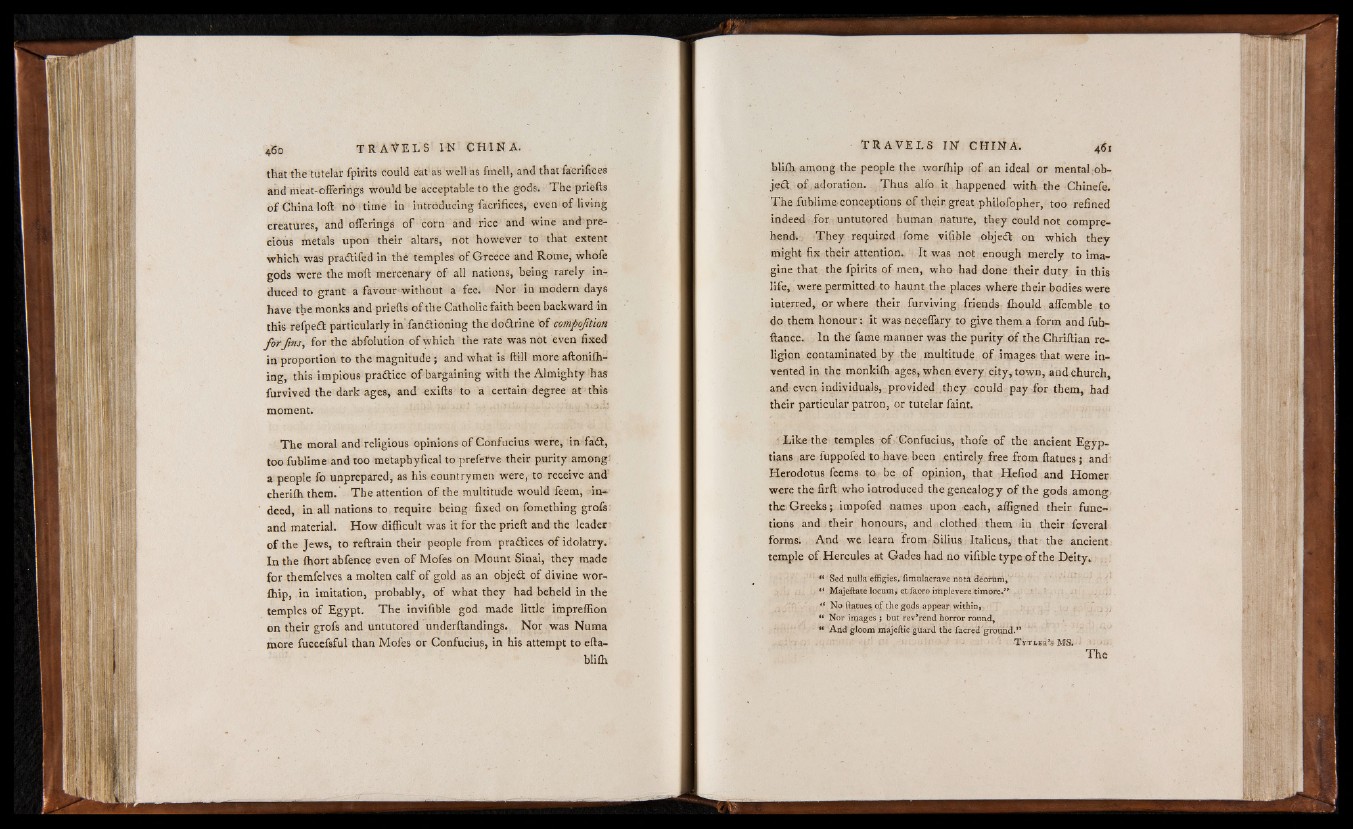
that the tutelar fpirits cotlld eat as well as fmell, and that facrifices
and meat-offerings would be acceptable to the gods. The priefts
o f China loft no* time in introducing facrifices, even o f living
creatures, and offerings o f corn and rice and wine and precious
metals upon their altars, not however to that extent
which was praftifed in the temples o f Greece and Rome, whofe
gods were the mod mercenary o f all nations, being rarely induced
to grant a favour without a fee. Nor in modern days
have the monks and priefts o f the Catholic faith been backward in
this refpedt particularly in fandtioning the dodtrine o f compojition
fo r fin s, for the abfolution o f which the rate was not even fixed
in proportion to the magnitude ; and what is ftill more aftonilh-
ing, this impious pradtice o f bargaining with the Almighty has
furvived the dark ages, and exifts to a certain degree at this
moment.
The moral and religious opinions o f Confucius were, in fadt,
too fublime and too metaphyfical to prefeive their purity among:
a people fo unprepared, as his countrymen were, to receive and'
cherilh them. The attention o f the multitude would feem, indeed,
in all nations to requite being fixed on fomething grofs
and material. H ow difficult was it for the prieft and the leader
o f the Jews, to reftrain their people from pradtices o f idolatry.
In the ihort abfence even o f Mofes on Mount Sinai, they made
for themfelves a molten calf o f gold as an objedt o f divine wor-
fhip, in imitation, probably, o f what they had beheld in the
temples o f Egypt. The invifible god made little impreffion
on their grofs and untutored underftandings. Nor was Numa
more fuccefsful than Mofes or Confucius, in his attempt to eftabliffi
bliih among the people the worihip o f an ideal or mental ob-
jedt of.adoration. Thus alio, it happened with the Chinefe.
The fublime conceptions o f their great philofopher, too refined
indeed for untutored human nature, they could not comprehend.
T h e y required fome vifible objedt on which they
might fix their attention. It was not enough merely to imagine
that the fpirits o f men, who had done their duty in this
life, were permitted to haunt.the places where their bodies were
interred, or where their furviving friends fhould affemble to
do them honour: it was neceffary to give them a form and fub-
ftance. In the fame manner was the purity o f the Chriftian religion
contaminated by the multitude o f images that were invented
in the monkiih ages, when every city, town, and church,
and even individuals, provided they could pay for them, had
their particular patron, or tutelar faint.
• Like the temples o f Confucius, thofe o f the ancient Egyptians
are fuppofed to have, been entirely free from ftatues j and'
Herodotus feems to be o f opinion, that Hefiod and Homer
were the firft who introduced the genealogy o f the gods among,
the G re ek s; impofed names upon each, affigned their functions
and their honours, and clothed them in their feveral
forms. And we learn from Silius. Italicus, that the ancient
temple o f Hercules at Gades had no vifible type o f the Deity,
" Sed nulla effigies, fimulacrave nota deoriim,^
. Majeftate locum, el faoro irhplevere timore.,>
N o ftatues o f the gods appear within,...
“ Nor images j but rev’rend horror round,
M A n d gloom majeftic guard the facred'ground.”
- T y rhER ’s M S . - '
The